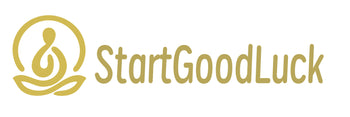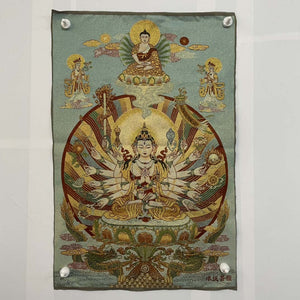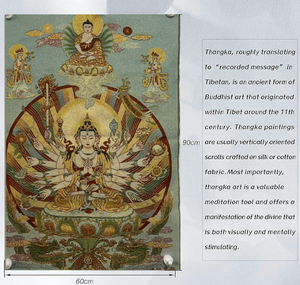Thangka Painting | Embroidered Thousand-Hand Avalokiteshvara on Lotus Throne: Compassion & Protection
110% Money-Back Confidence Guarantee
110% Money-Back Confidence Guarantee
The terms of the 110% Money-Back Confidence Guarantee promise that if there are issues due to quality or merchant errors, Startgoodluck will refund 100% of the payment to the customer and provide a next-time discount coupon of 10% with no minimum purchase requirement.
30-Day Returns
30-Day Returns
Our policy lasts 30 days. We understand that choosing personal items online can sometimes be challenging. Therefore, we gladly accept returns or exchanges within 30 days of purchase with valid proof of purchase. Please note that damages resulting from regular wear are not eligible for replacement. Most items from Start Good Luck must be unused and returned in their original packaging to qualify. Return shipping costs are the customer’s responsibility unless the return is due to an error on our part (e.g., incorrect or defective item). Original shipping fees and additional service charges like gift wrapping are non-refundable.
If your return is a result of our mistake, we will cover the return shipping cost.
Once we receive and inspect your returned item, we will process your refund or replacement if the item is in stock. Please note that after an exchange is completed, the item is no longer eligible for a refund.
Unfortunately, we cannot accept returns or exchanges after 30 days from the purchase date.
Free or $0.01 items from special promotions are considered final sale and may not be returned or exchanged.
To be eligible for a return, items must be unused, in their original condition, and in the original packaging.
Return labels are provided only for defective items within the policy period.
Return shipping fees vary based on product weight, your location, and the shipping method selected.
The following items are non-returnable:
1. Gift cards
2. Personalized products
3. Opened or used sage sticks, candles, and soaps
4. Free or $0.01 items
If your order arrives damaged, defective, incorrect, or missing an item, please contact us at: contact@startgoodluck.com
We always strive to ensure you’re 100% satisfied. Your feedback helps us improve—we’d love to hear from you anytime.
Items determined to be defective within one year of purchase may qualify for a 50% discount promo code for the same product (proof of purchase required).
To process a return, we require a receipt or proof of purchase.
Note: Please do not send returns to the address on the package. Contact us for instructions.
Refunds:
Once your return is inspected, we will notify you via email regarding the approval or denial of your refund. If approved, your refund will be processed within one week to your original payment method. Original shipping costs are non-refundable.
If you haven’t received your refund after following up with your bank or payment provider, contact us at contact@startgoodluck.com.
Sale Items:
Only regularly priced items may be refunded. Sale items are non-refundable.
Exchanges:
Exchanges are offered only for defective or damaged items. To request an exchange, email us at contact@startgoodluck.com.
Gifts:
If the item was purchased as a gift and shipped directly to you, you'll receive a gift credit once the return is processed. If the item was not marked as a gift or was sent to the purchaser first, the refund will go to the original buyer.
Returns Without a Label:
You are responsible for return shipping costs unless the return is due to our error. If a refund is issued, return shipping fees will be deducted. We highly recommend using a tracked shipping method. Start Good Luck is not responsible for packages lost without a tracking number.
110% Money-Back Confidence Guarantee:
The terms of the 110% Money-Back Confidence Guarantee promise that if there are issues due to quality or merchant errors, Startgoodluck will refund 100% of the payment to the customer and provide a next-time discount coupon of 10% with no minimum purchase requirement.
For product care instructions, please message us—we’re happy to help!
Have questions or need support? Reach out via:
Facebook: @Startgoodluck
Email: contact@startgoodluck.com
For our return shipping address, please email us at contact@startgoodluck.com.
Free Shipping Over $59
Free Shipping Over $59
Enjoy the convenience of free shipping on your orders! When you spend $59 or more, we will waive the shipping fees, allowing you to save while you shop. This offer applies to all eligible products in your cart. Simply reach the minimum purchase amount, and your shipping costs will be automatically deducted at checkout. It's our way of saying thank you for choosing us! Happy shopping!
Buy 2 Get 1 Free
Buy 2 Get 1 Free
This promotion means that when you add any three products to your cart (excluding items that are already priced at $0 or $0.01), you will automatically receive one of them for free at checkout. Enjoy the extra savings!






